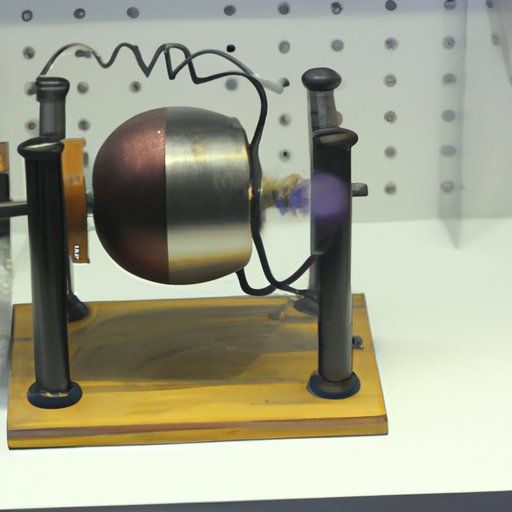Introduction
An electric motor is an electrical machine that converts electrical energy into mechanical energy. It has a wide range of applications in industry, home appliances, and transportation. The electric motor has revolutionized the way we live, work, and travel today.
This article will explore the history of the electric motor and the genius behind its invention. It will examine the contributions of various inventors who have contributed to the development of the electric motor over the years. We will also look at the evolution of the electric motor from the 19th century to today.
History of the Electric Motor: Who Invented It?
The invention of the electric motor can be traced back to the early experiments with electricity and motors in the late 18th century. During this period, scientists and inventors were exploring ways to harness electrical energy and convert it into mechanical energy. One of the first experiments was conducted by Italian physicist Alessandro Volta in 1799, who created a device that used static electricity to move a small paddlewheel.
The development of the first electric motor is credited to British scientist Michael Faraday. In 1821, Faraday discovered that when a current-carrying wire is placed in a magnetic field, it experiences a force. He used this principle to develop a primitive electric motor. Faraday’s motor was able to rotate a copper disk when exposed to a magnetic field.

A Look at the Inventor of the Electric Motor
Michael Faraday (1791–1867) was a British scientist who made significant contributions to the fields of electromagnetism and electrochemistry. He was the first to discover electromagnetic induction, which led to the development of the electric motor. Faraday also invented the electric generator, transformer, and several other electrical devices.
Faraday’s experiments with electricity and magnets paved the way for the invention of the electric motor. His discovery of electromagnetic induction allowed him to create a device that could convert electrical energy into mechanical energy. This invention was revolutionary and opened up new possibilities for the use of electricity.

Exploring the Origins of the Electric Motor
In the 19th century, several other inventors made significant contributions to the development of the electric motor. Among them was American inventor Thomas Davenport, who developed the first commercial electric motor in 1834. German physicist Wilhelm Weber built an improved version of Faraday’s motor in 1838. And Englishman William Sturgeon developed the first practical DC motor in 1832.
In addition to these inventors, there were others who helped to refine and improve the design of the electric motor. These included inventors such as Hippolyte Pixii, Zenobe Gramme, and Elihu Thomson. Their inventions and patents related to the electric motor helped to shape the modern-day design.
The Genius Behind the Invention of the Electric Motor
One of the most important figures in the development of the electric motor was Serbian-American inventor Nikola Tesla (1856–1943). Tesla, who worked for Thomas Edison in the 1880s, was a prolific inventor and innovator. He made numerous contributions to the development of the electric motor, including his patents for the AC induction motor, which is still widely used today.
Tesla’s contribution to the development of the electric motor cannot be understated. His innovations and patents helped to shape the modern-day design of the electric motor. His work also helped to pave the way for the widespread use of electricity in industry and everyday life.
How Did We Get the Electric Motor?
The electric motor has come a long way since Faraday’s primitive prototype. Over the years, the design of the electric motor has evolved significantly, due to advances in technology and materials science. Today, electric motors are more efficient, reliable, and powerful than ever before.
Advances in computer-aided design and manufacturing have enabled the production of smaller and lighter electric motors. Improvements in insulation and cooling systems have allowed electric motors to operate at higher temperatures and speeds. And the development of rare earth magnets has improved the efficiency of electric motors.

The Innovator of the Electric Motor
American inventor Thomas Edison (1847–1931) was also a key figure in the development of the electric motor. Edison was a prolific inventor who held over 1,000 patents in his lifetime. He made several important contributions to the invention of the electric motor, including improvements to the design of the generator and the development of the first practical storage battery.
Edison’s work helped to make the electric motor more accessible and affordable for everyday use. His innovations helped to pave the way for the widespread adoption of the electric motor in industry and transportation.
Conclusion
The electric motor has revolutionized the way we live, work, and travel today. Its invention can be traced back to the early experiments with electricity and motors in the late 18th century. Michael Faraday is generally credited with the invention of the electric motor, but other inventors such as Nikola Tesla, Thomas Edison, and William Sturgeon also contributed to its development.
Over the years, the design of the electric motor has evolved significantly due to advances in technology and materials science. Today, electric motors are more efficient, reliable, and powerful than ever before. The electric motor has had a profound impact on modern society, and its importance can never be overstated.
(Note: Is this article not meeting your expectations? Do you have knowledge or insights to share? Unlock new opportunities and expand your reach by joining our authors team. Click Registration to join us and share your expertise with our readers.)
